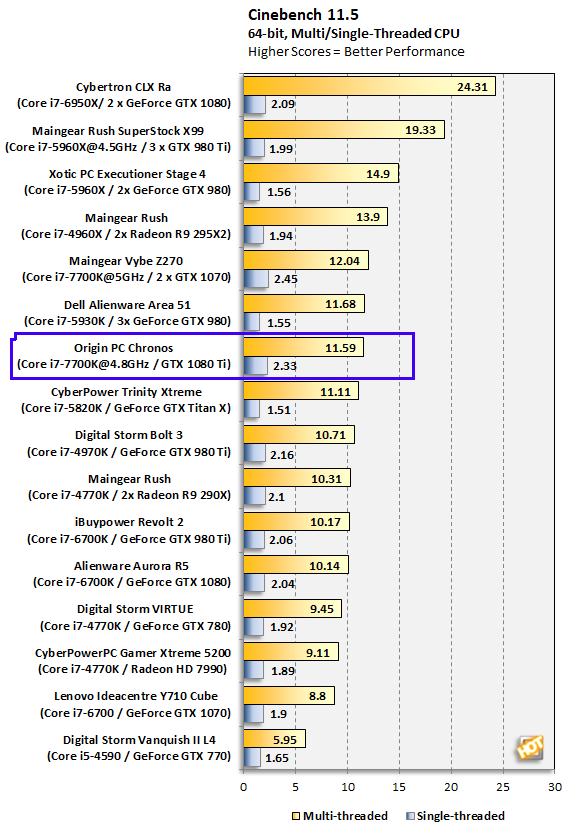Origin PC Chronos Review: A Powerful Small Form Factor Desktop PC For 4K Gaming
|
Based on Maxon Cinema 4D software, this test uses a 3D scene and polygon and texture manipulation to assess GPU and CPU performance. We ran the Main Processor Performance (CPU) test, which builds a still scene containing about 2,000 objects, for a total polygon count above the 300,000 mark. Here we're focusing strictly on software rendering on the CPU and it's heavily taxing on this one aspect of system performance, both with multi-threaded and single-threaded rendering.

Origin PC overclocked the processor in our machine to 4.8GHz, giving it a 600MHz boost over its stock clock speed. A lower than expected score could be indicative of an unstable overclock, but based on the numbers the Chronos returned, everything looks good. The multi-core score is only a fraction of a point below that of the Maingear Vybe, which is equipped with the same processor clocked 200MHz faster at 5GHz.
The only systems that gain any kind of separation from the Chronos are the ones powered by Extreme series processors with six or more physical cores to work with. Cinebench does an excellent job of utilizing cores and threads, so that is to be expected.
|
PCMark 8 simulates the workloads computers face in several different settings, including home, office and content creation. The benchmark also has a test that simulates a creative professional’s usage, as well as battery and storage tests. We ran the tests with OpenCL acceleration enabled to leverage the power of the Cybertron CLX Ra's GPUs, CPU and storage subsystem combined.

PCMark 8 tends to put a heavy emphasis on storage performance, though it also takes into consideration other hardware resources to evaluate how well a system will hand productivity workloads. The Chronos scored well here, earning it a top three spot in both the Work Accelerated and Home Accelerated benchmark runs.
We are not surprised to see the Chronos hang near the top of the pack. In addition to a relatively fast processor that's been overclocked to 4.8GHz, it also touts 32GB of DDR4-2666 RAM, a speedy 512GB Samsung 960 Pro SSD with an NVMe interface for shuttling data on the PCIe bus, and a mighty GeForce GTX 1080 Ti graphics card. This combination of hardware gives the Chronos a powerful foundation for just about any task that is set before it, whether that be gaming (as we'll see in a moment), content creation, or office work.
But enough about productivity performance, let's have a look at how the Chronos handles games with the visual quality settings cranked up...







